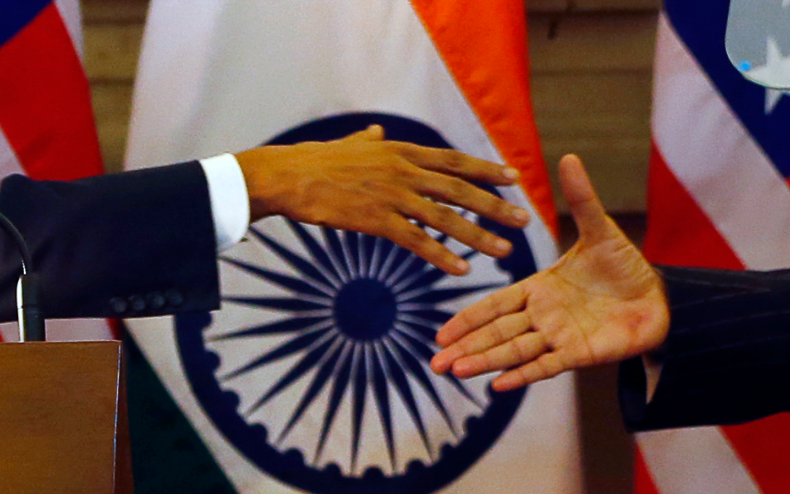News: Prime Minister Narendra Modi is scheduled to pay an official visit to the United Arab Emirates (UAE) from February 13-14, 2024; the visit will include inaugurating a temple built by the Bochasanwasi Shri Akshar Purushottam Swaminarayan Sanstha in Abu Dhabi.
Q1. India has numerous partnership agreements across the globe, but it shows more convergence with UAE than others. Explain the economic, cultural and strategic significance of its cohesion.
India’s relationship with the UAE has evolved into becoming one of the most prominent bilateral relationships for New Delhi. Not only has the UAE become India’s strategic partner but it has also become one of the most important linchpins of India’s engagement in the Gulf region.
Cultural ties:
● The BAPS temple, which is built on a 27-acre plot of land donated by the UAE President, will be the second big Hindu temple to be inaugurated in the UAE in recent years, the first being the Hindu Temple in Dubai, opened in October 2022.
● UAE President was felicitated in a road show when he was in Gandhinagar in January this year as the chief guest of the 10th Vibrant Gujarat Summit.
● India was the ‘Guest of Honour’ country at the Abu Dhabi Festival (ADF), the UAE’s annual cultural festival in 2018.
● During his visit to the UAE in 2019, PM of India was conferred the UAE’s top civilian honour, the Order of Zayed.
● Sheikh Mohammed Bin Zayed Al Nahyan (Crown Prince of Abu Dhabi and the Deputy Supreme Commander of the UAE armed forces) was the chief guest at the Republic Day parade in Delhi in January 2017.
● The IIT Delhi Abu Dhabi campus has been established, and the UAE opened a consulate in Hyderabad in 2023.
Economic ties:
● The convergence of ideas on global climate issues too was clear with India in Dubai for the COP28 climate summit. Both India and the UAE co-launched the Global Green Credit Initiative.
● Trading partner: Bilateral trade grew to $85 billion in 2022-23, making the UAE India’s third-largest trading partner and India’s second-largest export destination. The UAE is also the fourth-largest overall investor in India.
● The India-UAE Comprehensive Economic Partnership Agreement signed in 2022 aims to increase trade in services to $115 billion in five years. Recently the Indian government also approved the signing and ratification of a bilateral investment treaty with the UAE, which would significantly boost bilateral economic engagement, especially manufacturing and foreign direct investment
● Fintech is yet another area of mutual convergence. The RuPay card, a key component of India’s Digital Public Infrastructure (DPI), has been accepted in the UAE since 2019.
● Rupee-Dirham Agreement: India and the UAE also operationalized a rupee-dirham settlement system; in 2023, the Indian Oil Corporation made a rupee payment to the Abu Dhabi National Oil Company for crude oil imports.
Strategic ties:
● Energy security: The UAE is also India’s trusted partner in energy security, being the only nation from the region which has strategic oil reserves stored in India.
● An agreement was signed by Indian Strategic Petroleum Reserves Ltd (ISPRL) and the Abu Dhabi National Oil Company to invest in the strategic crude oil storage facility in Mangaluru with an initial investment of $400 million.
● I2U2 Group: Within the region, both countries are in close coordination and a part of a number of important groupings such as the I2U2 or the West Asian Quad comprising India, Israel, the United States and the UAE.
● IMEC: The UAE is also part of the India-Middle East-Europe Economic corridor (IMEEC) infrastructure project that was signed during the G-20 summit in Delhi. The corridor aims to connect India to Europe across the Arabian Peninsula, and is a potential rival to China’s Belt and Road Initiative.
● When the UAE hosted the OIC Foreign Ministers’ Meeting in 2019, it invited India’s External Affairs Minister (the late) Sushma Swaraj as a keynote speaker/guest of honour country despite protests from some nations, including Pakistan.
Challenges and issues should be focused:
● Chinese economic Influence: China’s “Cheque Book Diplomacy,” characterized by offering low-interest loans, has overshadowed Indian enterprises in the UAE and the broader Middle East.
● The Kafala system in the UAE gives employers more power over immigrant labourers, especially those in low-wage jobs, and presents significant human rights concerns.
● Non-Tariff Barriers (NTBs) The Non-Tariff Barriers like Sanitary and Phytosanitary (SPS) and Technical Barriers to Trade (TBT) adopted by the UAE, has dampened Indian exports related to poultry, meat and processed food.
Defence and security cooperation and people-to-people ties too are critical cogs in the relationship. The recent visit also comes at a critical time with the war in Gaza enveloping the region. The visit will provide the two leaders an opportunity to confer on this very critical issue. While India recognises and values the UAE’s role in the region, the UAE too is cognisant of the ‘global leadership’ role that India is set to acquire. Both countries recognise that this privileged strategic partnership is only set to grow stronger in the years ahead.

